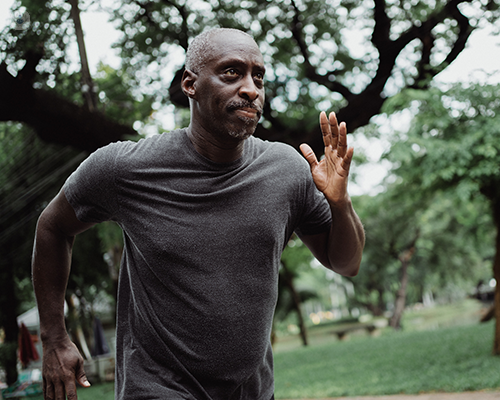How to overcome hip pain (part 1): optimise body weight
Written by:There are key actions to increase your hip strength that don’t involve surgery. With effort, time and patience you can reduce hip joint inflammation and potentially reduce the chances that you’ll need a hip replacement in the near future.
Mr Daniel Williams, an orthopaedic surgeon with specialist expertise in hip management, tells you how you can overcome hip pain.

How common is hip pain?
Around one in five of us will get hip pain at some time in our lives, from our early years through to needing a hip replacement later on in life.
What can hip pain be a symptom of?
Groin pain or pain felt into the thigh might be the first signs of inflammation or wear and tear from arthritis in your hip. It might feel like one of the following:
- Groin strain.
- Sharp pain with a click in the hip.
- A toothache type pain in the groin.
Any of these might be the first signs of hip inflammation or mild hip arthritis.
What’s the solution to hip pain?
If the pain has been going on for a while, you might think the answer is a hip replacement; but a joint replacement is a big deal – they’re basically advanced machine parts, and machine parts don’t last forever. So, before you decide to go that route, there are two key areas you can target to try and decrease inflammation and regain mobility. One of those being to optimise your body weight. The second is to increase back muscle strength, which I explain in part 2.
As we move about, bend and battle against the forces of gravity, a tremendous amount of force is exerted by the muscles on bones and joints holding us together. As weight shifts back and forth around the hip, acting a bit like a complicated seesaw, we put about five times our body weight through the hip joint. See my video for a quick explanation of body weight and joint pain.
If you’re 10 kilograms overweight (about 20lbs or 1.5 stone in old money), you’re putting an extra 50 kilograms or an extra 7 stone hammering through your hip with every step you take. And we take on average over one to three million steps a year. So that’s a lot of extra force your muscles and bones have to deal with and it’s no surprise that often leads to inflammation in the hip.
If you think you might be getting hip pain, try to think of it as a first sign to optimise your body weight. What’s good to aim for? I answer this question in this video and in the following section.
What body weight is good to aim for?
A target weight can help you alleviate joint pain. For most people, body mass index (or BMI) is a good place to start; BMI is a measure that uses your height to work out a healthy weight range. The NHS BMI calculator can help you work out your ideal weight.
As an example, a BMI of 18.5 to 25 is what you should be aiming for, which for a 5’6 tall woman is a body weight between 8st and 10st 4lbs; and a man who’s 5’10 should work towards a weight between 9st and 12.5st.
Losing weight and changing what and how you eat can be difficult. However, it is nutrition that’s been shown to be more important than exercise in getting back to a normal weight. ‘You can’t outrun a bad diet’ as the saying goes.
It’s tough, so get some help. Your GP or practice nurse can point you in the direction of help and support to change the way you eat. And aim to hit your target weight over 18 months, not over the next few weeks, or even months. Perhaps start measuring your weight regularly and cut right back on the amount of hidden sugar. There’s 4g of sugar in a teaspoon, so a can of soft drink may contain 7 or 8 teaspoons.
Learn more about overcoming hip pain by reading part 2: build back muscle strength.
Mr Williams’ excellent patient care is available via video and face-to-face consultations. See his profile to learn how he can help you look after your hip health.


